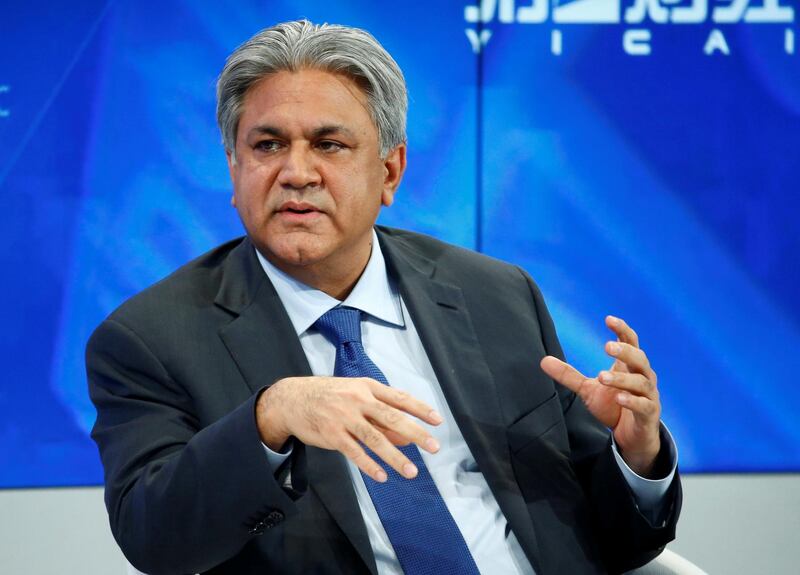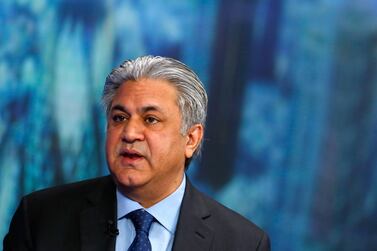One of Britain's best-known academic institutions quietly cut fraud suspect Arif Naqvi from a recruitment video for a finance course after having received more than £5 million (Dh23.9m) from his now-collapsed business, The National can reveal.
Mr Naqvi appeared in a video used to recruit students for the “world’s first master's in private equity” at the London School of Economics, but was edited out on Monday after his arrest and detention in the UK.
The postgraduate course, which costs students £35,000 a year, was established in 2009 with a £4m donation from part of Mr Naqvi’s former Abraaj Group empire, which went into liquidation in 2018 amid claims of mismanagement.
“It was all made possible by a generous grant from one of our alums, Arif Naqvi,” said Dr Ulf Axelson, a senior academic who describes himself as Abraaj Group professor, in a section of the video that was cut.
Donations from Abraaj eventually totalled £5.25m.
The video had been prominently displayed on the course's home page last week before The National contacted the university to ask about Mr Naqvi's funding after his arrest.
The master's in finance and private equity teaches 60 students from around the world offering “unparalleled access” to practitioners.
Last year's collapse of the Abraaj, based in Dubai, was the world’s largest insolvency in the sector.
While the university cut Mr Naqvi from the original seven-and-a-half-minute video, the full version was still available on Mr Naqvi’s YouTube channel.
“I think the quality of an LSE education is without doubt, being thrown into the melting pot of cultures, ideas, concepts,” Mr Naqvi said on the original video.
“I think it’s enabled me to debate with myself on the merits of various ways of looking at things.”
The edited video has been removed from the course homepage.
Overall, Mr Naqvi’s family, Abraaj and the Aman Foundation – his family’s charity that focuses on “transforming the lives of the most vulnerable citizens of Pakistan” – have given nearly £6.2m to the university in donations and scholarships, the school said.
It included money for a finance research programme that ran from 2009 to 2014 and five years of scholarships from 2006 to 2011.
“There has been no additional funding from Abraaj, the Naqvi family or Aman Foundation since 2010," the university said.
"The combined total of pledges, donations and scholarships to LSE from these sources – all confirmed before 2010 – was £6,179,500."
LSE said there had been plans to remove Mr Naqvi from the video for some time because the Abraaj funding had ended.
Mr Naqvi, 58, and his wife Fayeeza, who both graduated with economics degrees in 1982, are listed on the university’s benefactors’ board for 2006, along with Abraaj, to mark a “level of generosity” that has “defined the tradition of philanthropy at the school”.
They are among at least nine members of the Naqvi family who have studied at the university.
Co-founder & Chairman of #AmanFoundation Fayeeza Naqvi shares Aman's vision at event held to welcome #LSE Directors pic.twitter.com/QjFZVg9Uyi
— Sindh Rescue & Medical Services (@Sindh_ers) March 1, 2016
The reputation of the university previously suffered over its funding links to the Libyan regime of Muammar Qaddafi.
A charitable foundation run by his son Saif, who studied at the university, donated £1.5m that was used to set up a North Africa research foundation.
The scandal led to the departure of the university’s director in 2011.
An independent report published that year into links between the LSE and Libya discovered a series of management problems and a failure to carry out due diligence on the source of the Libyan funding.
The report sought to ensure that clear guidelines were put in place for international funding.
Mr Naqvi, who is Pakistani, was arrested at Heathrow Airport this month as he sought to leave Britain.
The US is seeking his extradition on charges of conspiracy, wire fraud and securities fraud after being accused of defrauding investors of hundreds of millions of dollars.
He denies wrongdoing but faces up to 45 years in prison if found guilty.
A British magistrate last week refused him bail for a £2m surety, saying he could flee to Pakistan, where he has well-connected allies, the court heard.







